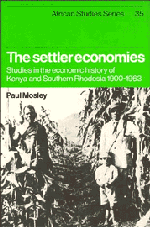Book contents
- Frontmatter
- Contents
- List of maps
- List of tables
- List of figures
- Preface
- A note on currency
- Abbreviations
- Kenya and Southern Rhodesia: principal place names
- 1 Introduction
- 2 The political constraints on economic behaviour
- 3 African agricultural development
- 4 The labour market
- 5 European agriculture
- 6 Secondary industry
- 7 Conclusions
- Notes
- Bibliography
- Index
- Frontmatter
- Contents
- List of maps
- List of tables
- List of figures
- Preface
- A note on currency
- Abbreviations
- Kenya and Southern Rhodesia: principal place names
- 1 Introduction
- 2 The political constraints on economic behaviour
- 3 African agricultural development
- 4 The labour market
- 5 European agriculture
- 6 Secondary industry
- 7 Conclusions
- Notes
- Bibliography
- Index
Summary
The principal purpose of this study has been to set the facts of Kenyan and Southern Rhodesian economic history against a stereotypical view of the evolution of the economy and economic policy in ‘settler economies’. According to this stereotype, European agriculture is unable to compete, and European enterprise of all kinds unable to secure a labour force, without the help of a thicket of protective and coercive measures. But although economically weak, the rural bourgeoisie, according to this stereotype, is so politically dominant that it can implement these measures without effective opposition from colonial bureaucracy, metropolitan ministry for the Colonies or indigenous population. The measures bring about a continuous reduction in the productivity of the African population, and this so effectively flattens out the curve of labour supply that shortages of African labour, when they arise, can be eliminated purely by political and not by economic means. But the subsistence level wages which this process implies hamstring any industrialisation which is based on the home market, and hence the economy remains ossified in its dependence on primary exports far longer than is normal for a country enjoying its level of average income, until eventually rescued by state intervention.
The research reported in Chapters 2 to 6 above suggests that if the data on which we have to depend give an accurate impression, this picture of the long-term development of a settler economy must be modified at many points in its application to Kenya and Southern Rhodesia.
- Type
- Chapter
- Information
- The Settler EconomiesStudies in the Economic History of Kenya and Southern Rhodesia 1900–1963, pp. 234 - 236Publisher: Cambridge University PressPrint publication year: 1983



